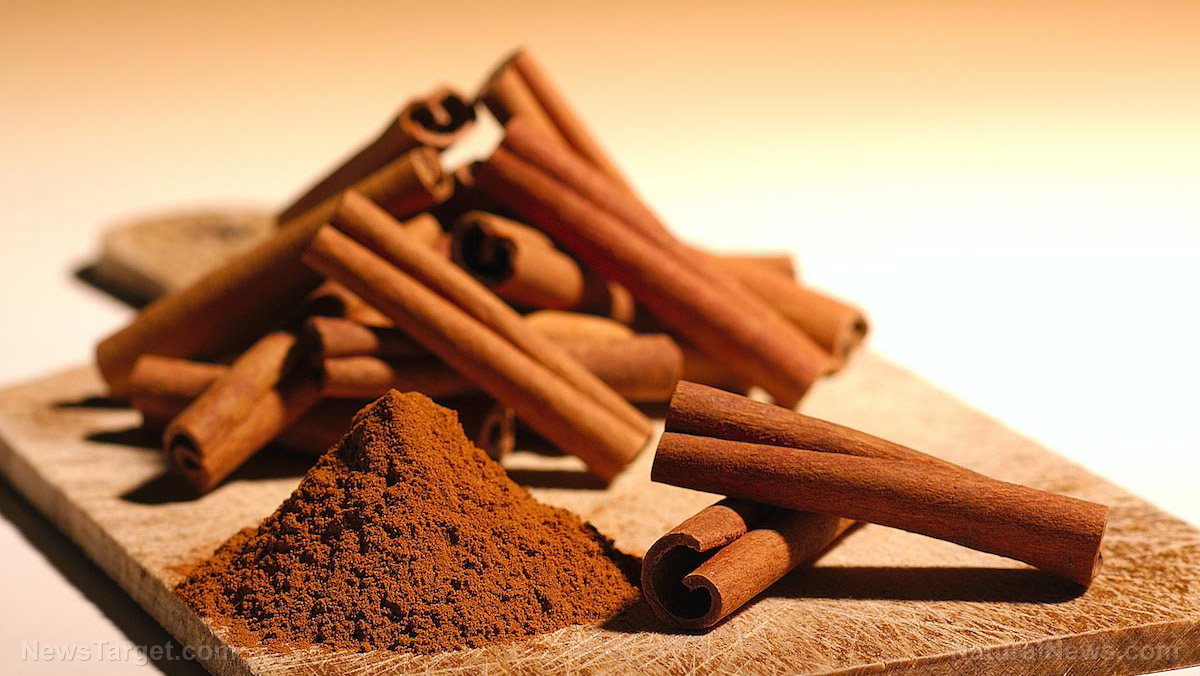Learn about brain health and nootropics to boost brain function
Spice up your life: Use cinnamon to improve your health

( Natural News ) Cinnamon is known to have medicinal properties and has been widely used for the treatment and prevention of certain diseases and ailments . This traditional medicine is effective for managing blood sugar, relieving digestive discomfort, reducing blood pressure and more.
There are two types of cinnamon: Ceylon cinnamon and Chinese cinnamon.
Ceylon cinnamon, also called true cinnamon, is rich in antioxidants that help your body neutralize free radicals and lower your risk of health conditions like cancer, heart disease and diabetes. Chinese cinnamon, on the other hand, is normally used as a flavoring agent for confectionery, desserts, pastries and meat. (Related: Health benefits of cinnamon: What’s the difference between Ceylon and cassia cinnamon? ) Health benefits of cinnamon
Cinnamon offers the following health benefits when used or consumed regularly:
Fights bacteria, fungi and viruses – Cinnamon has been used to fight bacteria, fungi and viruses in ancient China. Cinnamon bark contains essential oils that give it its distinct flavor and smell. Cinnamaldehyde, the active component of cinnamon bark essential oil, has antifungal, antibacterial and antiviral properties.
Has anti-inflammatory and antioxidant properties – Cinnamon contains large amounts of powerful antioxidants called polyphenols, which can protect the body from oxidative stress. It also has anti-inflammatory properties that can help with disease prevention.
Has prebiotic properties – Cinnamon can promote the growth of good gut bacteria, which can keep the bad ones in check. Adding cinnamon to your diet can also improve the health of your digestive tract.
Reduces blood pressure – Some studies suggest that cinnamon can help lower high blood pressure by relaxing the blood vessels . This helps improve blood circulation and keeps the heart healthy.
Relieves digestive discomfort – Cinnamon is used in Eastern and Western medicine as a remedy for gastrointestinal problems. In ancient times, people used cinnamon bark oil to treat digestive imbalances, metabolic syndrome and irritable bowel syndrome.
Lowers the risk of cardiovascular disease – Some studies suggest that cinnamon can help reduce the risk of heart disease. One particular study found that consuming half a teaspoon of cinnamon every day can reduce bad cholesterol (low-density lipoprotein) levels while keeping good cholesterol (high-density lipoprotein) levels stable.
Lowers the risk of Type 2 diabetes – Some studies suggest that cinnamon can help manage blood sugar levels by increasing insulin sensitivity . This means that cinnamon can improve the ability of cells to take up glucose from the blood.
Helps protect against cancer – A study conducted in mice with colon cancer showed that cinnamaldehyde in cinnamon is a potent inhibitor of cancer cell growth . According to the report, cinnamaldehyde helped cells combat carcinogens via detoxification and repair.
Supports brain health – Multiple studies have shown that cinnamon can help treat neurodegenerative diseases such as Parkinson’s disease and Alzheimer’s disease by protecting brain neurons from free radicals. Cinnamon has also been reported to improve cognitive function and motor function by normalizing neurotransmitter levels in individuals prone to developing Parkinson’s. Cinnamon contains two compounds that are responsible for inhibiting the build-up of harmful proteins in the brain.
There are different varieties of cinnamon that you can buy at grocery stores. Before using stronger versions of cinnamon, make sure to consult a natural health practitioner to check for any possible side effects. While it is generally safe for short-term use, some people can develop an allergic reaction to cinnamon. It also contains a chemical called coumarin, which may be harmful to those with liver disease.
To keep your cinnamon longer, store it in an airtight container. Whole cinnamon lasts for around a year, but ground cinnamon will start to lose its flavor in a few months. Make sure to use your cinnamon spice or supplement by their use-by dates for safety.
Get more information about the benefits of cinnamon and other spices at FoodCures.news .
Sources include:
Healthline.com 1
Healthline.com 2
Read more at www.naturalnews.com